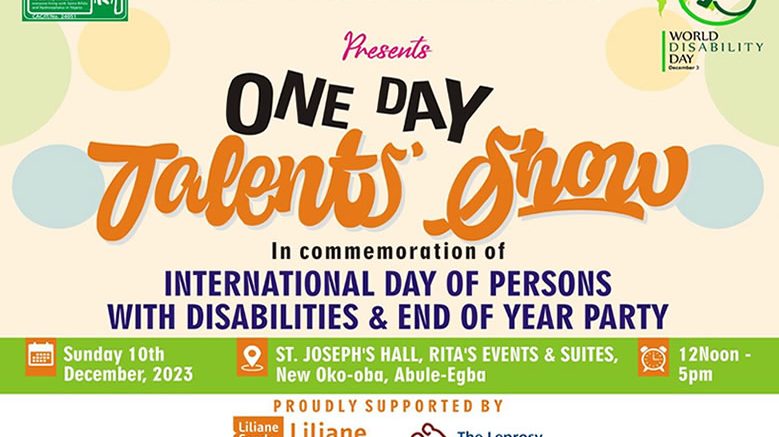FFF’s MESSAGE ON INTERNATIONAL DAY OF PERSONS WITH DISABILITIES
International Day of Persons with disabilities: Inclusive Development for People with Spina bifida and Hydrocephalus in Nigeria
Every 3rd of December, the world commemorates the International Day of People with Disabilities (IDPWD). The purpose of this day is to promote an understanding of disability issues and stimulate support for the dignity, rights, and wellbeing of persons with disabilities.
The theme this year is “Transformative solutions for inclusive development: the role of innovation in fueling an accessible and equitable world”. There are three thematic areas of innovation for disability inclusive development – employment (SDG8), reducing inequality, and sports. Since its inception, Festus Fajemilo Foundation (FFF) has continued to address the widescale inequalities faced by children and young people with spina bifida and hydrocephalus in Nigeria.
Inclusive development takes place when an entire community, including people with disabilities, benefit equally from development process. Inclusive development considers key areas such as awareness of and active involvement of marginalized groups, recognition, and appreciation of diversity that disability brings. Unfortunately, this is not the case in Nigeria where children and young people with spina bifida and hydrocephalus are faced with myriads of problems that have continued to threaten their full inclusion.
FFF uses Community-Based Rehabilitation (CBR) guidelines to advance disability inclusive development (DID) for children and young people with spina bifida and hydrocephalus. CBR contains five domains – health, education, livelihood, social inclusion, and empowerment.
Transformative solutions in Nigeria’s health sector
Children born with spina bifida, and hydrocephalus will have disturbance of functions of bladder and bowel, making them experience lifelong health condition known as incontinence. This is inability to have control over bladder and bowel nerves. There are health complications like skin sores which are often difficult to heal. At best, these complications lead to a need for regular catheterization. At worst (and sadly in developing countries including Nigeria), cause untimely death through infection or kidney failure. Children living with incontinence are psychologically affected by it, self-esteem is low, educational opportunities are reduced, relationship between families and friends are hard to maintain and employment opportunities are difficult to obtain later in life. Their parents and caregivers are overwhelmed and negatively impacted by the attendant burden of care.
In response to the dying need of children with spina bifida and hydrocephalus who face daily medical and social challenges owing to their inability to have control over their bladder and bowel, FFF initiated continence management program in Nigeria in 2016. The program has attained successes like establishment of 7 clinics (6 public teaching hospitals and FFF continence clinic) in 3 of the regions of Nigeria and training and equipping 60 health care professionals (nurses) to deliver comprehensive continence management and care. Despite challenges encountered, the continence program has contributed to improve health and wellbeing of at least 120 babies, children, and young adults with spina bifida and hydrocephalus in line with sustainable development goal 3.
Transformative solutions in Nigeria’s education sector
In developing countries, children with disabilities are less likely to attend school like their non-disabled peers. For children and young people with spina bifida and hydrocephalus, aside other barriers multidisciplinary care required could also disrupt their education programs. Recognizing this as a barrier to disability inclusive development, promoting inclusive education is one of the key priorities for FFF. Inclusive education seeks to address learning needs of children, young people, and adults, with a specific focus on those who are vulnerable to marginalization and exclusion. Consequently, FFF has implemented projects such as Cooperative Teaching Project, COVID-19 E-learning Intervention, as well as United for Inclusive Education (UIE). The aforementioned projects have contributed immensely to the strengthening of Lagos State inclusive education policy, human, technical and institutional capacity of organizations of persons with disabilities to participate actively in the implementation and monitoring of inclusive education in Lagos State.
The development of web-based platform for community of practice on inclusive education is another innovative concept by FFF to connect education stakeholders including policy makers, teachers, organizations of persons with disabilities, education focused CSOs/NGOs to promote knowledge sharing and uniformity in practice in Lagos State as well as scaling up to the national level.
Going Forward
As the world celebrates International Day of People with Disabilities, FFF pledges to continue to explore innovative ideas in our programs and activities to contribute her own quota towards the achievement of an accessible and equitable society in Nigeria.

